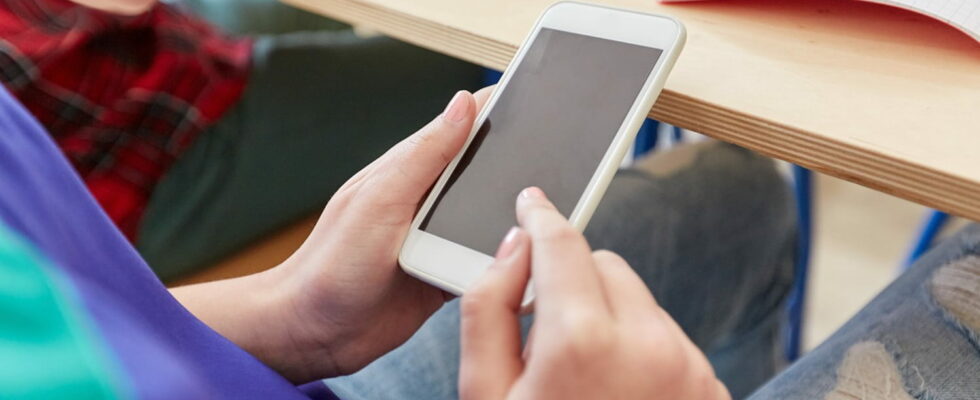Since the start of the school year, students at 200 middle schools have had to leave their smartphones in a locker to take a “digital break” at school. A measure which should be extended to all establishments by September 2025.
Today, young people are owning a smartphone earlier and earlier. According to a study by the Junior City firm published in 2021, more than half of schoolchildren aged 7 to 14 (55%) have a mobile phone… To the point of arousing the concern of parents, teachers and many organizations, who are pleading for supervision of their use , especially for smartphones. Addiction, violent or inappropriate content, sexual predators… The dangers are numerous, placing the use of these devices at the center of public debate.
Also, the Government has been looking, for several months now, at the possibility of simply banning smartphones in nursery schools, elementary schools and colleges. Since the start of the school year, 180 colleges have also been experimenting with a “digital break” requiring students to leave their phones in lockers or boxes in the morning when they arrive, only to pick them up again after class. The process should become widespread by September 2025.
Banning smartphones at school: a long-standing project
Emmanuel Macron himself had several times raised the possibility of imposing restrictions, or even bans on access to screens for the youngest. The problem was brought back to the forefront in schools at the start of the 2024 school year when, in addition to the distraction that the device causes and its impact on the concentration and learning of students, several tragic cases had demonstrated their role, sometimes fatal, in cases of cyberharassment.
Also, on August 27, 2024, during her press conference for the start of the school year, the resigning Minister of National Education, Nicole Belloubet, announced the experiment of banning mobile phones in nearly 200 colleges from this start of the school year, in order to implement a “digital break”.
The establishments involved “give us good feedback”says the current Minister Delegate in charge of academic success, Alexandre Portier, speaking to Cnews/Europe 1. Without telephones, young people would be “invest in this learning time”. The previous government had planned to generalize this measure from January 2025 – provided that the test returns were positive. However, Alexandre Portier would rather count “at the latest at the start of the school year [de septembre] 2025”. The Government wants to leave some leeway to school heads to implement the measure. “There is a huge amount of work to be done to implement it”he explained. “I think there is a national emergency. We are talking about the health of our young people, it is a mission on which we have no right to fail”.
In France, smartphones are in theory banned within high schools and colleges. The law allows the high school board of directors to introduce, into the internal regulations, a ban on the use of these devices by high school students. Students can keep them with them, but are not allowed to use them in the school building during or outside of classes, including during recess. This ban is valid during school time, but also extracurricular time. It is up to each establishment to determine practical arrangements to ensure compliance with the law. This new measure goes a step further. Concretely, students will have to place their smartphone in a locker when arriving at school.
This decision follows an expert report on the impact of screens on young people, commissioned by President Emmanuel Macron and submitted on April 30. Nicole Belloubet made it clear that it was not a question of “refute the educational use of digital technology”. On the contrary, the minister spoke of the importance of artificial intelligence in education, calling for the creation of a specific roadmap for its use in schools and colleges. “We must allow teachers to use artificial intelligence”she said.
Ban on smartphones at school: an experiment soon to be widespread
Still, this announcement raises some practical questions. Indeed, itIt is the local authorities who will have to manage practical questions. How will establishments logistically manage the drop-off and collection of hundreds of phones every day? What will be the sanctions for students who do not respect the rule? Will parents be okay with not being able to contact their little ones when they want?
This announcement comes in a particular political context given that Nicole Belloubet, at that time, belonged to a resigning government, and that Emmanuel Macron had not yet appointed a Prime Minister. Also, its action was supposed to be limited to “current affairs”, the scope of which turns out to be vague. In theory, they are limited to ordinary matters or emergencies and absolutely do not concern political initiatives.
This system is part of a broader movement of control and limitation of digital technology among the youngest carried by the resigning government and the President of the Republic well before the dissolution. Emmanuel Macron notably called, during a press conference held on April 25, to regain control over online content, believing that“before the age of 15, there must be parental control over access to this digital space“, and pleaded for the establishment of“a digital majority at 15 in Europe”.
An idea which seems to be shared by the majority of French people since, according to the results of a barometer on the use of screens by children and adolescents published last July, 73% of them say they are in favor of the ban social networks among those under 15, and 75% of respondents want their uses to be strongly restricted in high schools (see our article). It is for this reason that the new Government has decided to continue on this path.
